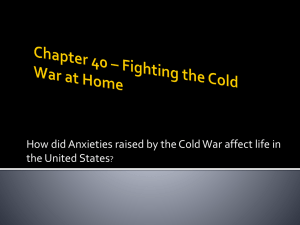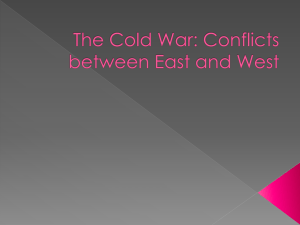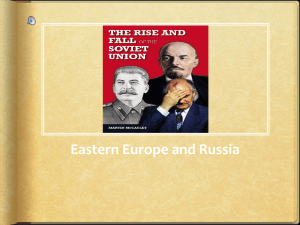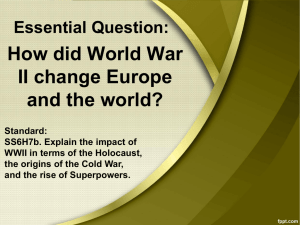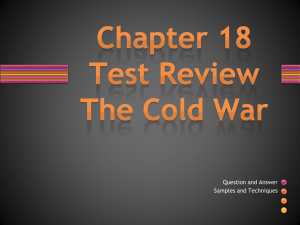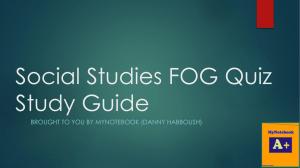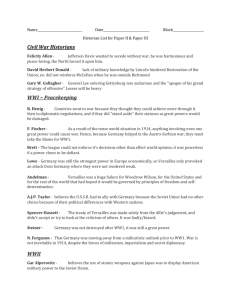Power and Politics in Russian History
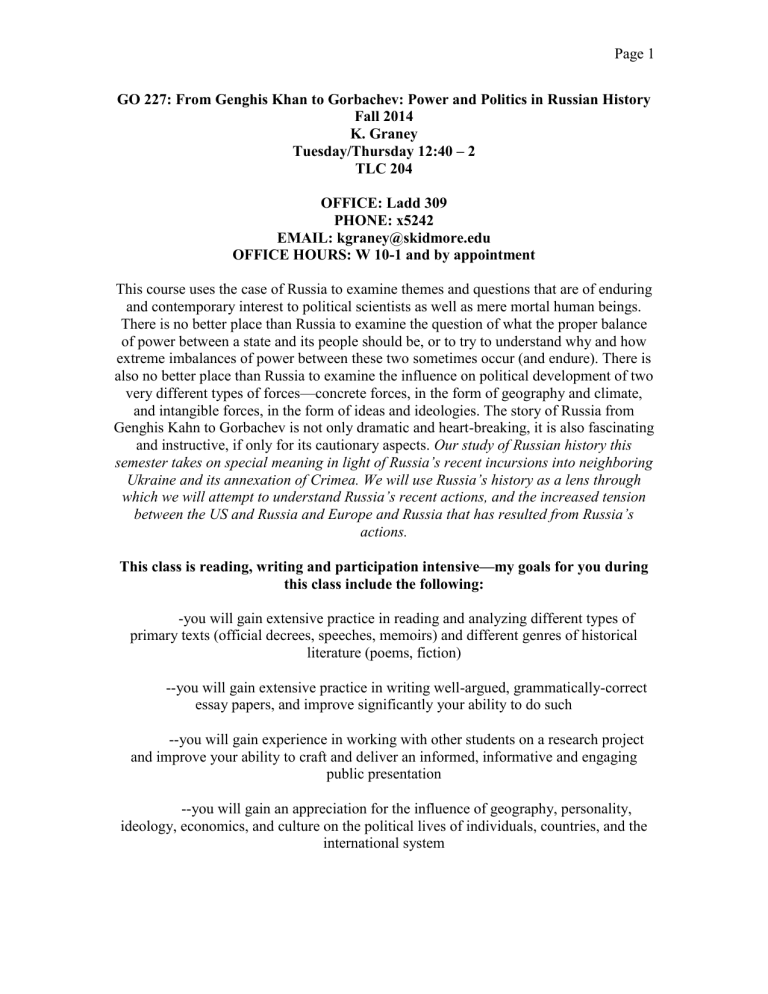
Page 1
GO 227: From Genghis Khan to Gorbachev: Power and Politics in Russian History
Fall 2014
K. Graney
Tuesday/Thursday 12:40 – 2
TLC 204
OFFICE: Ladd 309
PHONE: x5242
EMAIL: kgraney@skidmore.edu
OFFICE HOURS: W 10-1 and by appointment
This course uses the case of Russia to examine themes and questions that are of enduring and contemporary interest to political scientists as well as mere mortal human beings.
There is no better place than Russia to examine the question of what the proper balance of power between a state and its people should be, or to try to understand why and how extreme imbalances of power between these two sometimes occur (and endure). There is also no better place than Russia to examine the influence on political development of two very different types of forces—concrete forces, in the form of geography and climate, and intangible forces, in the form of ideas and ideologies. The story of Russia from
Genghis Kahn to Gorbachev is not only dramatic and heart-breaking, it is also fascinating and instructive, if only for its cautionary aspects. Our study of Russian history this semester takes on special meaning in light of Russia’s recent incursions into neighboring
Ukraine and its annexation of Crimea. We will use Russia’s history as a lens through which we will attempt to understand Russia’s recent actions, and the increased tension between the US and Russia and Europe and Russia that has resulted from Russia’s actions.
This class is reading, writing and participation intensive—my goals for you during this class include the following:
-you will gain extensive practice in reading and analyzing different types of primary texts (official decrees, speeches, memoirs) and different genres of historical literature (poems, fiction)
--you will gain extensive practice in writing well-argued, grammatically-correct essay papers, and improve significantly your ability to do such
--you will gain experience in working with other students on a research project and improve your ability to craft and deliver an informed, informative and engaging public presentation
--you will gain an appreciation for the influence of geography, personality, ideology, economics, and culture on the political lives of individuals, countries, and the international system
Page 2
--you will gain an appreciation for the importance of understanding different times and places in helping you understand better the meaning of your own life, the world you live in, and how you might want to live your own life
REQUIRED BOOKS (available for purchase at Skidmore Shop):
A Documentary History of Communism in Russia edited by Robert Daniels
The Soviet Colossus, by Michael Kort (7 th Edition)
Behind the Urals: An American Worker in Russia’s City of Steel , by John Scott
A Day In the Life of Ivan Denisovich , by Alexander Solzhenitsyn
Fathers and Sons , by Ivan Turgenev
Other Mandatory Readings Available through Scribner Library Course Reserves (ARES) system: http://illiad.skidmore.edu/ares/
ASSIGNMENTS:
1.
Class Participation and Classroom Comportment (10%): INFORMED participation in classroom discussions, in-class simulations (including most importantly the simulation on OCTOBER 8), in-class quizzes and writing assignments (unannounced, probably will be about 5 or so, both multiple choice and short answer) . Adherence to the Government Department
Comportment Code enhances your grade for this section of the class, failure to adhere to it will negatively impact your grade.
Please see the GOVERNMENT
DEPARTMENT COMPORTMENT CODE at the end of this syllabus for explication of expectations regarding civility .
2.
Biography / Role Play from Dual Power Period: (10%) Two-part assignment.
First part: Bibliography of at least 4 academic sources that you will use to write a short autobiography of the character you have been assigned for the OCT 8 role play/simulation. Further guidelines will be forthcoming.
DUE THURSDAY
SEPTEMBER 25
Second Part: 2-3 page autobiography, written in the first person voice but containing pertinent details taken from the sources in your biography. (These details should be properly footnoted.) DUE: THURSDAY OCTOBER 9
3.
Analytical Paper #1 on Tsarist Era (5-7 Pages)(20%): DUE TUESDAY
OCTOBER 21
4.
Group Research Presentation: Additional information on format and schedule will be handed out (20%)
Page 3
5.
Analytical Essay #2 on Early Soviet Era (5-7 Pages): DUE THURSDAY
NOVEMBER 20 (20%)
6.
Final Exam (20%): Tuesday, December 16, 1:30 pm. TLC 204
OTHER IMPORTANT INFORMATION:
CLASS EMAIL LIST:
I will be sending out reading and discussion questions on the class email list before every class (I will also try to post them on Blackberry. We’ll see.) It is TRULY in your best interest to use these questions to help guide your reading and your preparation for class EVERY DAY. The questions for the periodic and unannounced quizzes that are part of your class participation grade will be drawn directly from these email questions, and you will be able to use any notes you have taken for these quizzes (though you may not use the readings/ books themselves).
POLICY ON LAPTOPS / TEXTING / SURFING IN CLASS: Unless you have an accommodation documented by the Coordinator for Students with Disabilities, in the
Office of Student Academic Services, the use of laptops or iPads during this class, for taking notes or otherwise, is strictly prohibited , as is the use of cell-phones or any other texting or web-surfing device.
ATTENDANCE: I expect you to be here every day, ready to participate. Absences are keenly noted (I take attendance) and will adversely affect your class participation grade.
Sports team related absences must be requested in writing and all classroom work must be made up. In general, documentation is useful, but not always sufficient, for absolution of absences
DUE DATES FOR PAPERS:
Papers are due at the beginning of class, on time, on the day indicated in the syllabus. If your paper is going to be late, it is INFINITELY better for you to come to class that day and then turn in the paper later. Skipping class on the due date to finish a paper will result in a larger reduction in your grade than had the paper simply been delivered late.
PLAGIARISM AND CHEATING
Don't do it. I and other faculty members have become sensitized to the popularity of internet paper services, and routinely employ services such as those found at
"plagiarism.com" and other websites to prevent plagiarism.
GRADING
As noted in the Skidmore College Catalogue , Grades are assigned on the following basis
(NB: a “B” is “superior work”, it’s official college policy!):
Page 4
A -- Distinguished work
A-, B+, B -- Superior work
B-, C+, C --Satisfactory work
C-, D+, D--Passing but poor quality work
Schedule of Readings and Assignments:
NOTE: all readings due on day listed
Th Sept 4: Syllabus and Class Policies
-Please read Putin’s Speech on the Annexation of Crimea: Available at http://eng.kremlin.ru/transcripts/6889
Tu Sept 9: Russia Under the Old Regime
--
--
Richard Pipes
Rowley,
, Russia Under the Old Regime
Exploring Russia’s Past , selections
, p.1-24,
, ARES
ARES
-Michael Kort, Soviet Colossus , Chapter Two, “The Autocratic State", p.8-12
Th Sept 11: Imperial Russia: Land of the Tsars and Serfs
-Michael Kort, Soviet Colossus , Chapter Two, “The Autocratic State", p.12-18
--"Reorganization of Russia by Peter the Great",
Tu Sept 16: Imperial Russia, Continued
ARES
--Catherine the Great's "Instructions", ARES
--"Childbirth, Christening and Wife-beating", from
Russia , ARES
Village Life in Late Tsarist
Th Sept 18: Intellectuals Arise: Slowly But Surely:
--Michael Kort, Soviet Colossus, Chapters 3, 4, 5 ( "The Nineteenth Century
Crisis”, “The People”, and “The Intelligentsia”), p.19-44.
--"War of 1812", (p. 190-195), ARES
--"The Decembrist Movement", (p.207-229), ARES
--Begin reading Fathers and Sons
Tu Sept 23: Rise of Intelligentsia, Continued
-Sergei Nechaev, “Catechism of a Revolutionary”,
--Continue reading Fathers and Sons
ARES
Page 5
Th Sept 25: Discuss Fathers and Sons
** BIBLIOGRAPHY ASSIGNMENT DUE TODAY
Tu Sept 30: Marxism and Lenin: Bolsheviks and Mensheviks
--Michael Kort, Soviet Colossus , Chapters 6 and 7 (“Capitalism Comes to
Russia” and “The Revolutionaries Regroup”), p.47-73.
--Marx and Engels, Communist Manifesto , ARES
--Robert V. Daniels, A Documentary History of Communism, p.4-17
Th Oct 2: 1905 and World War One in Russia
--Michael Kort, Soviet Colossus , Ch. 8, (“The Final Years and Last Stand”), p.74-
88.
--“Concessions of Nicholas II to the 1905 Revolution”, Nicholas II "Speech from the Throne,” and “The Government’s Declaration to the First Duma,” ARES
Tu Oct 7: The Russian Revolution: FEBRUARY 1917
--Kort, Soviet Colossus, Ch. 9, “Russia’s Two Revolutions”, p.87-top 99
--Robert V. Daniels, A Documentary History of Communism, p.42-top 47
Th Oct 9: The Russian Revolution: OCTOBER 1917
**IN-CLASS SIMULATION ON DUAL POWER: 2-PAGE PAPERS DUE
--Kort, Soviet Colossus, Ch. 9, “Russia’s Two Revolutions”, 99-113
--Robert V. Daniels, A Documentary History of Communism, p.52-72
Tu Oct 14: Civil War / War Communism
--Robert V. Daniels, A Documentary History of Communism, p.mid 72-73, mid
80-85, 91-96
--Michael Kort, The Soviet Colossus, Ch. 10 (“Into the Fire: Civil War”)
Th Oct 16: Building the Soviet State: Multicultural and Gender Policy
--Robert V. Daniels, A Documentary History of Communism, p.107-113 and 102top of 104
--Michael Kort, The Soviet Colossus , Ch. 11 (“New Problems, New Policies”)
Tu Oct 21: 1920s: NEP / Death of Lenin/ Rise of Stalin
**FIRST 5-7 Page Paper Due**
Page 6
-- Robert V. Daniels, A Documentary History of Communism, p. 117-118, p. bottom 144-mid 147, mid 158-159, mid 162-mid 164
-- Michael Kort, The Soviet Colossus, Ch. 12 (“Bolshevism Without Lenin”)
Th Oct 23: Stalin Revolution: COLLECTIVIZATION
--Michael Kort, The Soviet Colossus, Ch. 13 (“The Revolution from Above”), p.
199-mid 210
-- Robert V. Daniels, A Documentary History of Communism , p.170-173, bottom
177-179, bottom 188-mid 190
Tu Oct 28: Stalin Revolution: INDUSTRIALIZATION
--Michael Kort, The Soviet Colossus, Ch. 13 (“The Revolution from Above”), p. mid 210-mid 215.
--Robert V. Daniels, A Documentary History of Communism , p. bottom 180middle 183
-- John Scott, Behind the Urals , Introduction, 2-50, 137-70
Th OCT 30: INDUSTRIALIZATION CONTINUED and CULTURAL
REVOLUTION:
-- Robert V. Daniels, A Documentary History of Communism , p. 193-198
Tu Nov 4: Terror and Purges :
--Michael Kort, The Soviet Colossus, Ch. 13 (“The Revolution from Above”), p.
215-243.
-- Robert V. Daniels, A Documentary History of Communism , p. bottom 205-217
Th Nov 6: Life in the GULAG:
--Alexander Solzhenitsyn, A Day in the Life of Ivan Denisovich
--Anne Applebaum, GULAG: A HISTORY , “Introduction”, ARES
Tu Nov 11: Gulag Continued; Road to WW2, WW2 in Russia:
**GROUP PRESENTATION ON US-USSR RELATIONS DURING WW2
--Solzhenitsyn, continued.
--Robert V. Daniels, A Documentary History of Communism , p. 228-235
--Michael Kort, The Soviet Colossus , Ch. 14 (“Trial by Fire: The Great Patriotic
War”)
Th Nov 13: End of an Era? Birth of Cold War, Stalin, Hitler and Mao
Page 7
**GROUP PRESENTATION ON BIRTH OF THE COLD WAR
---Michael Kort, The Soviet Colossus , Ch. 15 (“Stalin’s September Songs”)
Tu Nov 18: NO CLASS: PROF GRANEY CONFERENCE
Th Nov 20 Rise of Khrushchev: De-Stalinization and Thaw
**ANALYTICAL PAPER #2 DUE**
**GROUP PRESENTATION ON KHRUSHCHEV’S RELATIONS WITH US
--Michael Kort, The Soviet Colossus , Ch. 16 (“Khrushchev: Reforming the
Revolution”)
--Robert V. Daniels, A Documentary History of Communism , p.mid 254-bottom
258, bottom of 275-279
Tu Nov 25: Brezhnev and Stagnation
**GROUP PRESENTATION ON DETENTE
--Michael Kort, The Soviet Colossus , Ch. 17 (“The Brezhnev Era: The Graying of the Revolution”)
--Robert V. Daniels, A Documentary History of Communism , p.280-283
Th Nov 27: Thanksgiving Break: NO CLASS
Tu Dec 2: Life in the Brezhnev Era, Dissidents: Solzhenitsyn Redux
**GROUP PRESENTATION ON SOVIET INVASION OF AFGHANISTAN
--Hedrick Smith, The Russians , Excerpts, ARES
--Robert V. Daniels, A Documentary History of Communism , bottom 290-top 302
Th Dec 4: Rise of Gorbachev / Perestroika and Glasnost: 1985-1990
**GROUP PRESENTATION ON GORBACHEV AND REAGAN
--Robert V. Daniels, A Documentary History of Communism , p.337-341, bottom
347-351
--Michael Kort, The Soviet Colossus , Ch. 19 (“Gorbachev: From Restructuring to
Destruction”), p.355-392
Tu Dec 9: Collapse of Empire: Fall of Gorby, Rise of Yeltsin and Autopsy on the
Soviet Union : 1990-1991
Page 8
--Michael Kort, The Soviet Colossus , Ch. 19 (“Gorbachev: From Restructuring to
Destruction”), p.392-407 AND Ch. 20 (“The Russian Devolution ”), p.355-392
-- Robert V. Daniels, A Documentary History of Communism , p. bottom 373-377,
383-392
Tu Dec 16: Final Exam at 1:30
**
DEPARTMENT OF GOVERNMENT**
SKIDMORE COLLEGE
POLICY ON CIVILITY AND COMPORTMENT IN THE
CLASSROOM
FALL 2005
The classroom experience is the heart of liberal education, and as such is the most important aspect of your Skidmore College education. Presumably, if you did not agree you would not be attending Skidmore. The faculty of the Government Department takes this understanding as the basis of our educational efforts. It is in an attempt to honor the centrality of the classroom experience that we offer this department policy on civility and comportment.
As is stated in the Student Handbook , your presence at Skidmore College is contingent upon your acceptance of, and full adherence to, the Skidmore College Honor
Code. This honor code is distinct from the oath you take when writing a paper or taking an exam – it is in fact much more all-encompassing, and much more demanding.
The Code includes the following statement: “ I hereby accept membership in the
Skidmore College community and, with full realization of the responsibilities inherent in membership, do agree to adhere to honesty and integrity in all relationships, to be considerate of the rights of others, and to abide by the College regulations.” Elsewhere, the Code also calls all Skidmore students to “ conform to high standards of fair play, integrity, and honor.
”
Page 9
What does it mean to do act honestly, with integrity, and according to high standards of fair play, particularly in the classroom? In our view, it includes, minimally, the following.
1.
No student shall lessen the learning experience of others in the classroom by arriving late to class.
2.
No student shall lessen the learning experience of others in the classroom by leaving the classroom while class is in session, except for true medical emergencies.
3.
Cell phones must be turned off during class.
4.
No student shall disrupt the learning experience of others in the classroom by talking to a neighbor, writing notes to other students, reviewing one’s mail, reading the newspaper, completing homework for other classes, or playing with the laptop computer, while class is in session.
5.
No student shall disrespect other Skidmore students, professors or the housekeeping staff by putting feet on the desks or other furniture in the classroom, or by leaving trash, food, or recyclables in the room at the end of the class session.
While we will hold all students to these minimal expectations, we also have some suggestions for those who seek to go beyond the bare minimum of civil classroom comportment to become the type of mature, responsible, active learners who are an asset to any classroom and society at large. These include the following.
6.
Every student should take copious and meaningful notes both on assigned readings and during classroom sessions. Note taking is an important skill—if you do not already possess it, you should acquire it.
7.
Every student should take some time to review the notes that he or she has taken on the day’s assigned reading before each class meeting. You will be amazed how much more invested and engaged in the class you will feel if you go into the classroom well-prepared.
Page 10
8.
Disruptions in class can be a significant impediment to learning, and no member of the Skidmore community—including faculty and students—should tolerate them. Thus every student should take responsibility for holding his or her peers and classmates to both high academic standards and high standards of civility. If people around you are chatting, passing notes or otherwise detracting from the overall quality of YOUR classroom experience, don’t let them get away with it.
9.
Individual faculty members in the Government Department will determine the level of sanctions for disruptive behavior.
